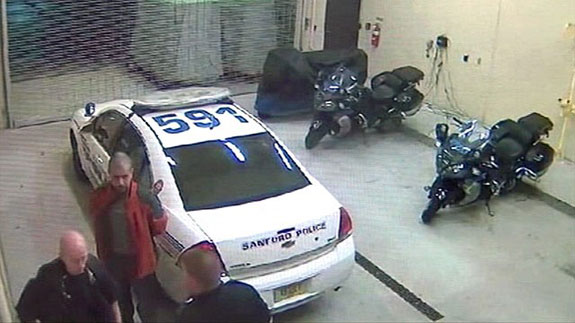
The police video from the night Trayvon Martin was shot and killed by George Zimmerman. (Screenshot: ABC News.)
By Ashley Lopez
Florida Center for Investigative Reporting
As the Florida Legislature considers tweaks to the state’s controversial “Stand Your Ground” law, legislators have added a provision that would stop journalists from gaining access to court records in cases involving self-defense.
According to The Tampa Bay Times/Miami Herald Tallahassee bureau:
People found to have used justifiable force in a “stand your ground” hearing could apply to have all court records related to their case expunged and made unavailable to the general public, according to an amendment filed by Rep. Matt Gaetz, R-Fort Walton Beach.
Gaetz said the purpose of the amendment is to provide more privacy for those cleared of charges.
“The point is to make sure that someone who appropriately uses the ‘stand your ground’ defense doesn’t have their life ruined by the use of that defense,” Gaetz said.
The change has already gained public support of the NRA’s Marion Hammer—the most influential pro-gun lobbyist in Tallahassee.
The Times/Herald reports, “Hammer said she had no hand in writing the amendment, but agrees with Gaetz that it is necessary.”
“If you didn’t do anything wrong, why should you have a record that you did?” Hammer said Thursday. “Why would the public need to know that? A person’s right under the Constitution is to be free of persecution, so it’s not right that you could be persecuted because of something that is inaccurate, for something that you didn’t do.”
This could become a contentious issue considering the state’s history with self-defense cases.
One of the most controversial and widely reported “Stand Your Ground” cases—the George Zimmerman murder trial—was originally not even going to happen.
At first, Zimmerman was not charged with the shooting death of unarmed black teen Trayvon Martin. However, after media reports and rallies all over the country, Gov. Rick Scott assigned a special prosecutor to try Zimmerman.
Zimmerman was eventually acquitted.
However, cases like this in the future could be expunged from court records and the public will likely not know anything happened.
This change to “Stand Your Ground” could also alter many aspects of how the media and academics deal with the law.
Fist, the change would restrict reporting on the law, which has greatly concerned Florida journalists.
According to left-leaning Media Matters:
As the bill makes its way through the legislative process, top Sunshine State journalists are worried that making these records unavailable to the public will damage their ability to do proper journalism.
Among those speaking out are top reporters and editors at the Tampa Bay Times, which conducted a lengthy 2012 investigation into Stand Your Ground that won industry praise and raised concerns about the applications of the law, including the fact that in nearly four out of every five cases involving a Stand Your Ground defense, homicides were deemed justified if the victim was black.
“Closing records and putting controversial cases that involve violence into the dark is a bad idea, it is against democracy,” said Neil Brown, Times editor and vice president. “This would have inhibited our work further. Our work was done based on court records as well as the stories of the incidents when they occurred.”
The Times coverage was named a finalist for the Online News Association’s Knight Award for Public Service and the Nieman Foundation for Journalism’s Taylor Award for Fairness in Journalism. The investigation has played a key role in informing other outlets’ coverage of cases relating to Stand Your Ground statutes.
It utilized hundreds of court and arrest records to reveal that the law was being interpreted in many different ways and being applied without a uniform approach, according to Kris Hundley, one of the three Times reporters who worked on the project.
This provision could also limit academic work on “Stand Your Ground.” Many universities and think tanks have been looking in to how the law is applied in real-life and what the implications are for the nearly two-dozen states that have similar laws on the books.
